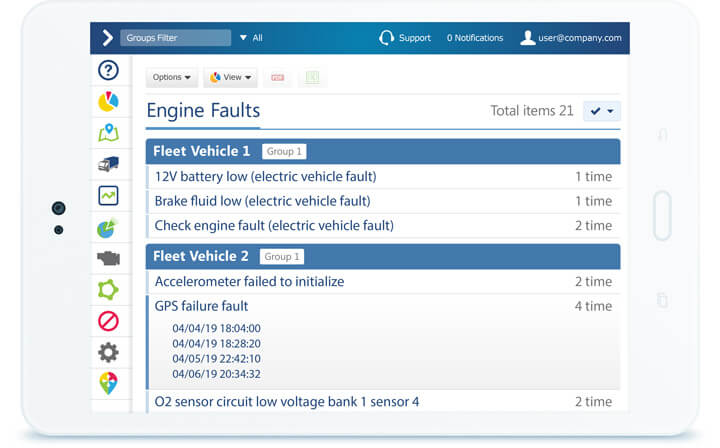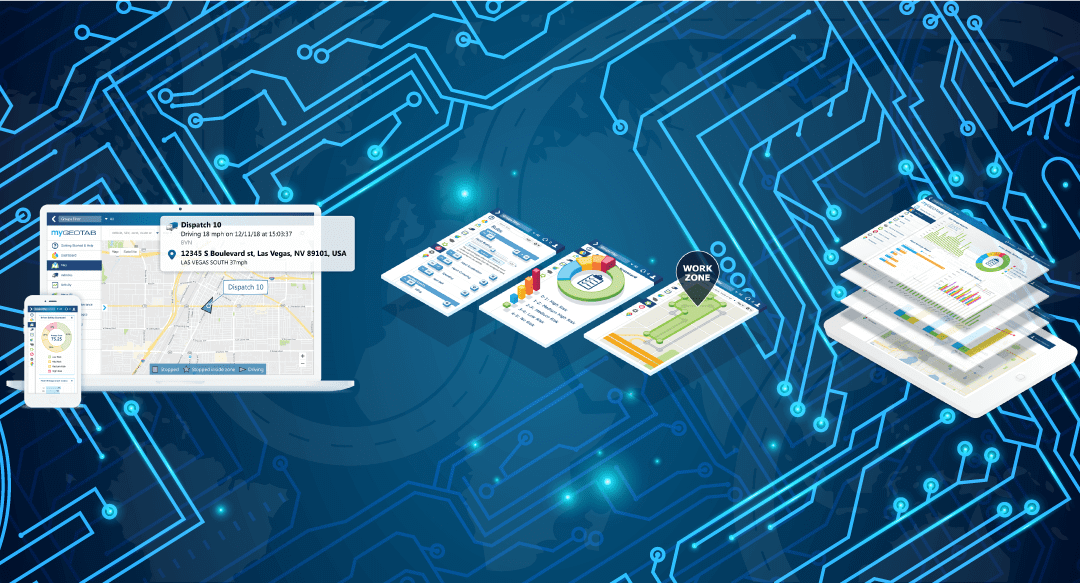
Fleet Management
These days, there’s just no good way to manage a working fleet without a good Geotab fleet management system. Margins are too tight, and costs are too complicated, to keep track of by hand. You need a quality software tool to maintain oversight of your fleet and look for opportunities to optimize your costs.
There are numerous fleet management solutions on the market, with or without Geotab integration. Without extensively demoing systems for months, how can you tell which ones will be best suited for your needs? These are some of the major features you should look for.
3 Must-Haves in A Geotab Fleet Management System
1 – A software focus
Fleet management systems will always have some hardware, such as Geotab, which is necessary for pulling information from your trucks and other vehicles. However, the main focus of the system should be on the software. Hardware can only provide data; software provides insights and solutions.
A system that focuses too much on hardware may leave you with too much data, and too few resources for sorting it.
2 – Deep configurable reporting
On the topic, data is only as useful as the insights that you can pull from it. A great Geotab fleet management system should offer a range of pre-made reports, as well as the ability to generate custom reports which are based on your own goals and needs.
Ideally, the system should be able to report on vehicles and drivers. After all, a driver’s on-road habits can have a huge impact on costs, such as drivers wasting fuel by accelerating and braking too hard. The best fleet management solutions allow you to oversee both the mechanical and human sides of your operation.
3 – Systems integration and interoperability
Your business undoubtedly has many existing data streams. A quality fleet management system should be able to integrate easily with your existing software and pull in data from other sources with minimal trouble.
Beware of “all-in-one” solutions that want to lock you into a single ‘walled garden’ that won’t work with other software. This is a one-way street to vendor lock-in.
VLC Makes Fleet Management Easy!
We’re proud partners with Geotab, one of the best fleet tracking systems on the market. We provide top-quality fleet management and analysis software to work alongside it. VLC TripDAWG solutions can help you manage your fleet, keep tabs on drivers, and avoid costly legal problems through smart warning systems.
Contact us to learn more or arrange a demo.

Fleet Management
What Are the Most Important Fleet Management Metrics to Track?
If your business relies on a working fleet in its daily operations, it’s absolutely vital to get the most possible value from those vehicles. Costs of fleet ownership continue to go up, especially fuel costs and replacement electronics, so a smart fleet manager should be constantly tracking data and looking for the best ways to optimize operations.
A great fleet maintenance management software solution provides the tools to collect, track, and analyze vast amounts of data – but it takes the human touch to know which pieces of information are most important.
At VLC, we have extensive experience helping fleet managers make the most of their vehicles – and these are the metrics we tell our clients to always focus on.
Ten Critical Metrics to Track For Optimizing Your Fleet Maintenance Management
1 – Daily Vehicle Inspection Reports (DVIR)
Your DVIRs are one of the single most important data sets you can collect. Yes, they can alert you to immediate problems with the vehicles, but their real value is long-term. Properly stored and analyzed, they give you deep insights into the health and performance of every vehicle. In many cases, you even get early warnings of maintenance issues before they become a big problem.
2 – Component lifespans
Every component in your vehicle has an expected lifespan, typically measured in either years or miles. This information is almost impossible to track by hand, but a fleet maintenance management system can track your vehicles at the component level. You’ll have early warnings that a component is near its EOL, allowing you to proactively replace it before a breakdown happens.
3 – Miles and gas mileage
Fuel costs are difficult to manage even in the best of times, and right now, anything you can do to improve your vehicles’ MPG is going to significantly reduce ongoing costs. By tracking the odometer and gas mileage over time, you’ll know early on if some sort of problem is affecting performance. It might be a mechanical issue or a bad driving habit, but either way – you’ll be able to address the problem sooner, rather than later.
4 – Asset utilization
Accurately tracking the utilization of your vehicles is critical for avoiding both over-and under-utilization. An under-utilized vehicle either needs to be used more or else potentially be removed from service to avoid the maintenance costs. Over-utilized vehicles are going to be less reliable and prone to breakdown, and – at least – need more maintenance attention to keep them running at peak performance.
5 – Total maintenance costs
How much are you spending per vehicle to keep it on the road? And is this expense actually justified by its returns? Too often, fleet managers can get into the habit of simply paying for repairs and maintenance, without doing a TCO/ROI breakdown on those costs. If a vehicle has become a money pit, you should know as soon as possible so that you can start exploring alternatives.
6 – Stock inventory
If your business truly relies on having vehicles on the road at all times, it’s vital to keep enough spare parts in your inventory to do replacements as quickly as possible. However, this can be tricky if you’re trying to track all your spares by hand. Good fleet management systems incorporate inventory management tracking as well, so you’ll always know when it’s time to order more spares – before they’re required.
7 – Driver performance and safety
When your fleet management software is linked to vehicle telematics systems, you don’t only get information about the vehicle – you also have a powerful tool to monitor driver performance as well. From staying within the speed limit, to whether they stop at train crossings, you’ll know whether they’re driving in ways that are safe and efficient. If not, it’s time for some coaching.
8 – Driver assignments and profitability
Some drivers are better at some tasks than others; that’s just human nature. With good data tracking and oversight of your drivers, it’s easier to spot both their strong points and their weak points. This leads to much smarter driver assignments, allowing you to make the most of your human resources as well as your vehicle resources.
9 – Technician productivity
Which of your technicians are working the hardest, and who does the best work which stands up over time? This can be derived from your maintenance records, cross-referenced with the responsible technician. This opens new opportunities to optimize your technical staff while spotting workers in need of more coaching or training.
10 – TCO / ROI
All of this adds up to the ability to track the most important metrics of all: TCO and ROI. You’ll know in detail how much you’re spending on your trucks, their efficiency, and their value to the company. From purchasing decisions to governmental reporting, this information is invaluable.
We Have the Fleet Maintenance Management Solutions You Need
VLC helps you make the most of your working fleet! Click here to learn more about our services.

Fleet Management
Keep Your Cleaning and Restoration Fleet Running Smoothly with These Fleet Management Tips
Cleaning and restoration services are in high demand right now, and if you want to maximize the value of your business, it’s critical to keep your cleaning fleet in top condition. With the right fleet management solutions by your side, this becomes much easier – and can even improve your profitability.
How do you make the most of your cleaning vehicle fleet management? Here are a few tips.
Four Ways to Do More With Your Restoration Fleet
1 – Utilize electronic vehicle inspection systems
If your fleet is still relying on drivers/operators to fill out inspection reports on paper, you could be missing out on a lot of critical information. Paperwork can take a long time to file, not to mention being prone to errors. With an electronic inspection system sending data straight to a database, it’s going to be more reliable, and give you instant access to the data for analysis.
2 – Embrace electronic maintenance orders
On the topic of paper being unreliable, this is also true for maintenance orders. It’s far too easy for a problem report to become lost in the shuffle or set aside to be handled and then forgotten about. When maintenance orders and problem reports are electronic, they’ll be in the system, and sending you alerts if they aren’t performed promptly. This reduces downtime and ensures your vehicles are always reliable.
3 – Constantly monitor vehicle performance
Maintenance problems almost always manifest as small problems before they become big problems – often so small they can go unnoticed by drivers. For example, if a vehicle’s gas mileage suddenly drops, the driver probably won’t notice unless it’s extreme. However, if you have a fleet management solution tracking key performance metrics, the analytical systems can spot even minor deviations from the baseline. These deviations point towards problems that should be fixed now to save time and money later.
4 – Accurately track expenses
How accurate are your TCO calculations? Tallying up expenses can be time-consuming and prone to errors if you’re doing things by hand. However, good fleet management systems can quickly calculate every expense related to every vehicle, providing you solid data for TCO – and providing indications of things that could be improved for better profitability.
Fleet Management Solutions
Vehicle Licensing Consultants specialize in helping working fleets run better. If you know your restoration fleet isn’t performing as well as it should, contact us to explore your options in fleet management solutions!

Fleet Management
Why Every Fleet Manager Needs Good Fleet Maintenance Management Software
Few innovations have changed the world of fleet management like fleet maintenance management software systems. They first gained traction in the 1990s, and as online communications expanded, they only became more and more useful over time. Today, fleet management systems are a must-have for anyone who’s overseeing a working vehicle fleet.
In this article, we wanted to go over the basics: what is fleet maintenance management, and what benefits does it bring to fleet managers?
I. What Is Fleet Maintenance Management Software?
The basic purpose of all fleet management software is to take over processes and operations that would otherwise have to be done by hand. This is accomplished through a combination of robust database-driven software, gathering data through electronic monitoring of the vehicles and their components.
In the past, fleet management software focused largely on physical monitoring of the vehicles, such as tracking their position on the road via GPS. Today, software can integrate a huge range of features and modules, including:
- GPS tracking
- Route planning
- Fuel use and emissions
- Maintenance logging
- Miles and hours
- Driver behavior on the road
- Telematics data, such as component performance
- Regulatory compliance and electronic filing
In addition, fleet management software can also integrate with other database/software systems you use. So, for example, you could potentially use the GPS tracking system to feed information into a customer-facing portal that allows them to track shipments. Or fleet efficiency can be analyzed within the context of overall business performance, to see how fleet operations are impacting the bottom line.
Plus, it greatly reduces the chances of human error. Since the software is typically pulling its data directly from other computer systems, this creates far fewer opportunities for manual data input to create problems.
The overall time-savings for you, by themselves, can easily justify the investment into a new software package. However, there are numerous other ways that fleet management software can keep paying for itself year after year.
II. What Are the Biggest Benefits To Fleet Maintenance Management Systems?
1 – Engage in smarter proactive/preventative maintenance
The number one priority when managing a working fleet is to see that fleet operating at the best possible efficiency, with as few accidents or breakdowns as possible. This becomes far easier to accomplish with fleet management software.
It can track the overall ‘health’ and performance of your vehicles over time. This can apply to a vehicle as a whole, but better software can even track individual components – including their maintenance history and expected operational lifespans. When was the last time a particular vehicle had its spark plugs changed? How long have those tires been on the road without replacement? Questions like these become simple to answer. You can even set up alerts that let you know when it’s time for repairs or replacement before any operational incidents occur.
This can greatly reduce unplanned downtime and prevent your fleet from ever becoming the cause of a bottleneck.
2 – Keep your drivers/operators safe
Another major priority is protecting your human assets – which is also easier to accomplish with good software on your side. Obviously, preventative maintenance will go a long way towards reducing the danger to the drivers, but that’s only the beginning.
Vehicle telematic systems can give you near real-time overviews of your drivers’ on-road behavior. Are your drivers driving safely? Are they following the rules of the road? You get clear reports on their behavior moment-by-moment, allowing you to oversee their performance and coach them as is appropriate.
Plus, should an incident ever occur, you’ll be notified of the problem almost instantly. This reduces response time in case of an accident or other emergency.
3 – Reduce fuel costs
Fuel costs keep rising, and there’s very little reason to think that trend is going to change any time soon. Keeping costs down means improving fuel efficiency, and you have numerous ways of accomplishing that.
Fleet maintenance management software almost always includes route-planning capabilities, so you can keep looking for better and more efficient routing. Modern systems can take a holistic view of vehicle utilization, planning routes globally, as well as optimizing individual routes.
Driver monitoring also contributes here. You’ll be able to see if drivers are behaving in ways that waste fuel, such as over-relying on ‘autopilot’ systems or being too aggressive in their acceleration and braking. This opens more opportunities for coaching and emphasizing the importance of fuel-smart driving.
Plus, all that preventative maintenance will also help ensure optimal fuel use. If the components on the vehicle are performing at peak spec, the overall impact on fuel use will be quite positive.
4 – Streamline regulatory compliance and auditing
Most working fleets have numerous regulatory hurdles to overcome, including reporting drivers’ hours, maintaining emissions standards, and keeping up with licenses and permits. Your fleet maintenance management software will track all these on your behalf, alerting you when critical regulatory events or deadlines are coming up. In some cases, automatic electronic filing is also an option, if the agency in question allows for it.
In addition, your paperwork and audits will be more reliable as well. With fewer opportunities for human error, you’ll see fewer problems with your filings and potentially avoid major bureaucratic headaches.
Fleet Maintenance Management Software Makes Your Life Easier
That’s what it boils down to. With the right software package on your side, you’ll be able to do more, in less time, and have plenty of data demonstrating your efficiency. It’s a win-win proposition. Reasonably priced software can pay for itself in a matter of months, or even weeks while continuing to provide real cost benefits for years to come.
Vehicle Licensing Consultants (VLC) specializes in making fleet management easier! We started off focusing on licensing and regulatory compliance, but now we offer a full range of fleet management services and products. We have a team of professionals, each dedicated to in-depth knowledge of the latest rules, regulations, news, tools, and financially smart application to provide you with the best opportunities for success.
If you’re struggling to keep your fleet moving on time, and within budget, we can help! Click here to learn more about us and our products.

Fleet Management
What Distinguishes the Best Fleet Management Solution Software Packages?
Today, maintaining a working fleet without a good fleet management solution is nearly impossible. Most fleet managers already have software for overseeing their operations – but is it the best software for your needs?
Fleet management software is getting better every year, adding more necessary features and benefits. Today’s fleet management solutions are robust, multi-faceted, and integrated into other critical systems.
They go beyond merely tracking vehicles and maintenance, to giving you deep insights into how vehicle management ties into the business operations as a whole.
If you’re using fleet management software that’s several years old, there are plenty of reasons to consider upgrading to a new solution.
Four Big Benefits to A New Fleet Management Solution
1 – Maintenance and part replacement warnings
Fleet management software can track each component on a vehicle, including its maintenance history and expected lifespan. These can be tied to warnings that pop up when a part is due for maintenance or replacement. This critical information allows you to perform better preventative maintenance, stopping accidents or breakdowns before they happen.
2 – Keeping drivers safer
There are several ways better software improves driver safety. Beyond preventing unnecessary breakdowns on the road, they can also track driver performance directly. You can see which of your drivers are following the rules of the road, and which need coaching on better driving techniques.
3 – Reduce fuel usage
Keeping fuel costs low is critical right now, as the costs of transportation continue to go up. You’ll be able to monitor fuel use in every vehicle independently, with warnings if a particular vehicle’s MPG suddenly drops.
You’ll be able to review driver behavior (such as needlessly aggressive acceleration and braking) as well as utilize preventative maintenance to replace items such as tires which can contribute to poor fuel efficiency.
4 – Robust reporting
Thanks to the huge amount of data that current fleet management software packages track, you get excellent reporting abilities. Virtually any aspect of your fleet can be analyzed and reported on, including crossover reports showing how fleet performance is impacting the business as a whole. This gives fleet managers a true wealth of information for improving the value of the fleet.
Fleet Management Solutions
Vehicle Licensing Consultants (VLC) specializes in improving fleets and fleet management systems. From regulatory compliance to reducing your fuel use, our tools and expertise help your fleet run better. Click here to learn more about us.

Fleet Management
How Data-Based Fleet Maintenance Management Improves Your Operations
When looking to reduce the costs of a working vehicle fleet, it’s all about preventative care. Fleet maintenance management which is focused on preventing breakdowns and other problems will ultimately pay off by significantly reducing ongoing costs, preventing work stoppages, and of course, helping protect your drivers and operators.
Today, it’s easier than ever with data-based systems. A combination of real-time sensors on the vehicle and computer software collating the data allows you to see vehicle performance stats at a truly granular level. This makes preventative maintenance far easier to accomplish, while further improving your cost savings!
Four Ways Data-Based Fleet Maintenance Management Prevents Needless Costs
1 – Smart alerts
If a particular vehicle is due for an oil change, how would you know? Are the brakes on a vehicle within their operational lifespan, or have they passed the expected EOL? These sorts of issues could require a lot of time and attention to keep on top of – except now because software can do it for you. Modern fleet management systems can store purchase dates, maintenance records, end-of-warranty information, and more – sending you alerts whenever a needed bit of maintenance is coming up.
2 – Tracking tire pressure and status
Modern vehicles are able to closely monitor the status and performance of their tires, and that translates into highly useful data for you! You’ll be able to see tire pressure and tire age for every vehicle, which can also be cross-referenced with other statistics such as acceleration and braking times. Combined, this means you’ll know exactly which tires are beginning to underperform, allowing you to repair or replace them before they become unreliable.
3 – Prevent regulatory woes
Numerous aspects of your vehicles must be officially inspected and\or certified. Keeping up with those can be another major headache. However, this is another area where fleet maintenance management software shines. It can keep track of the legal side of fleet management, and ensure you know whenever a vehicle is in danger of non-compliance.
4 – Protect your drivers on the road
A smart vehicle monitoring system receives updates in real-time. That means you could potentially become aware of a problem on the road, such as low fluids before the driver even notices. So, even more problems can be avoided while keeping your drivers safe from accidents.
Vehicle Licensing Consultants (VLC)
VLC has years of experience making it easier for fleet managers to oversee and maintain their fleet! Click here to learn more about our services.







